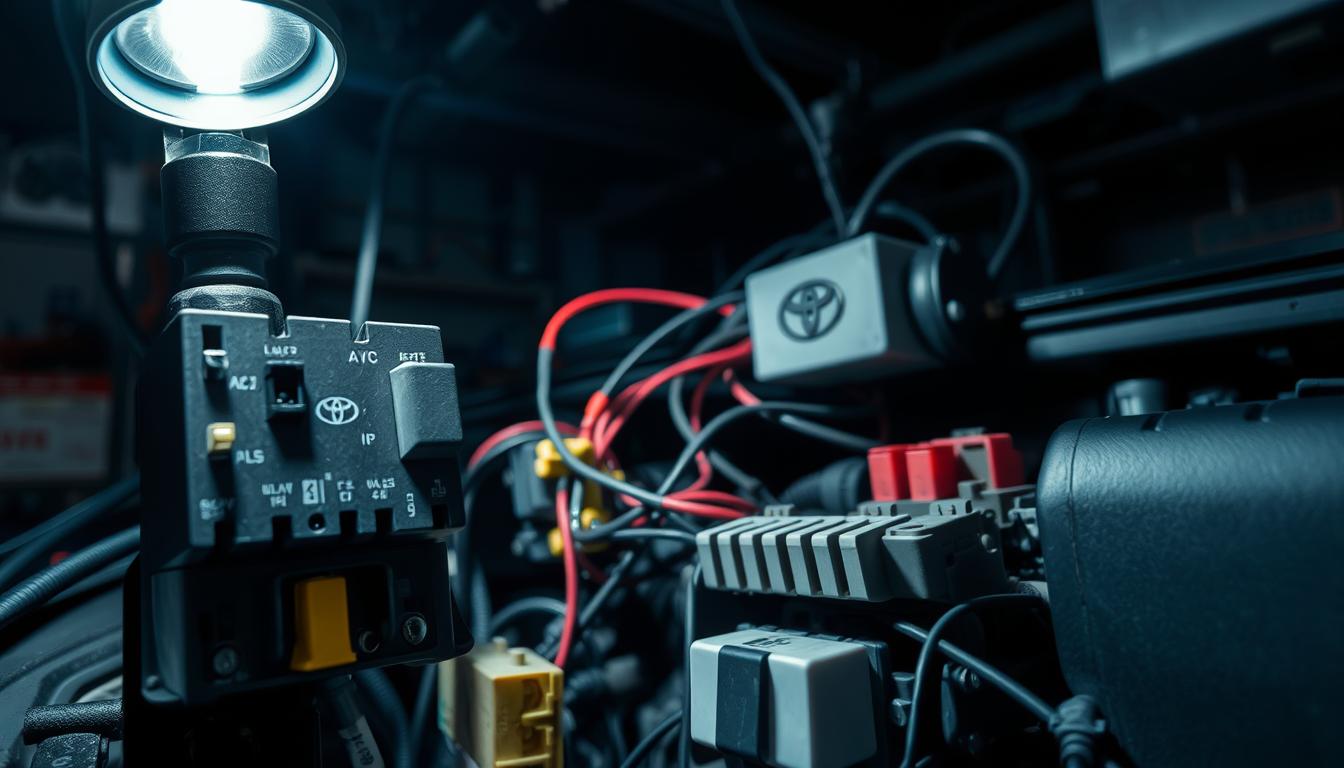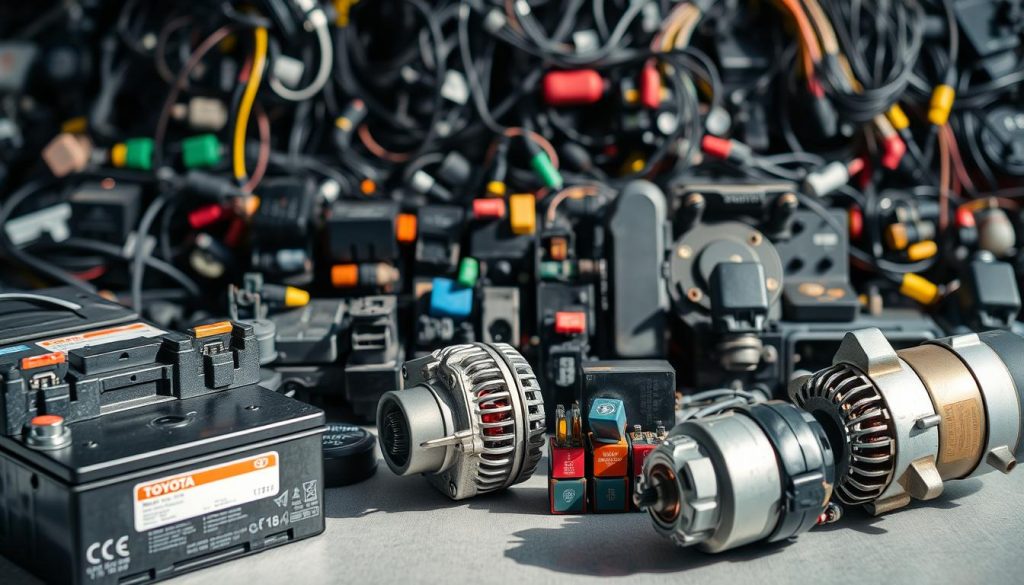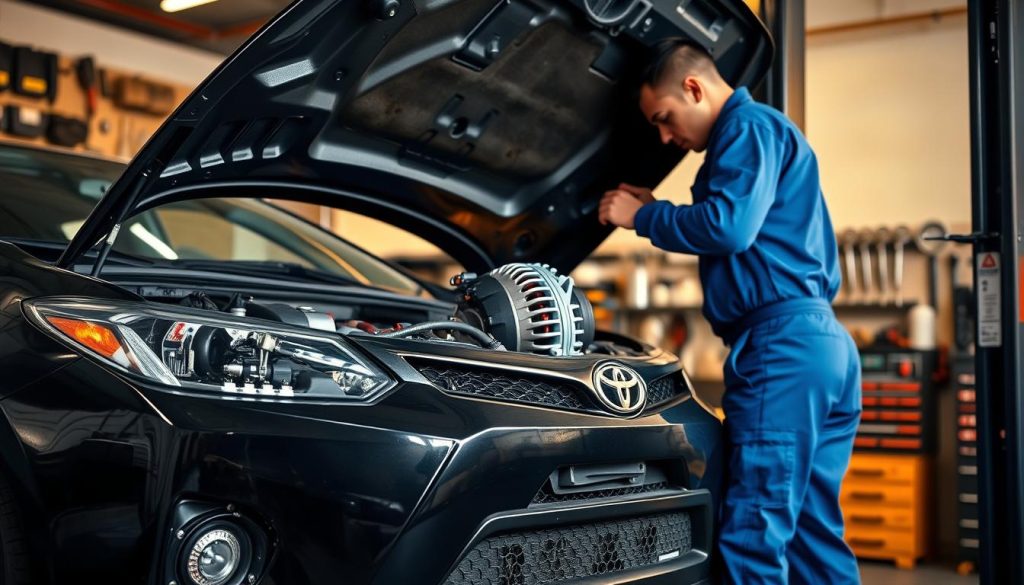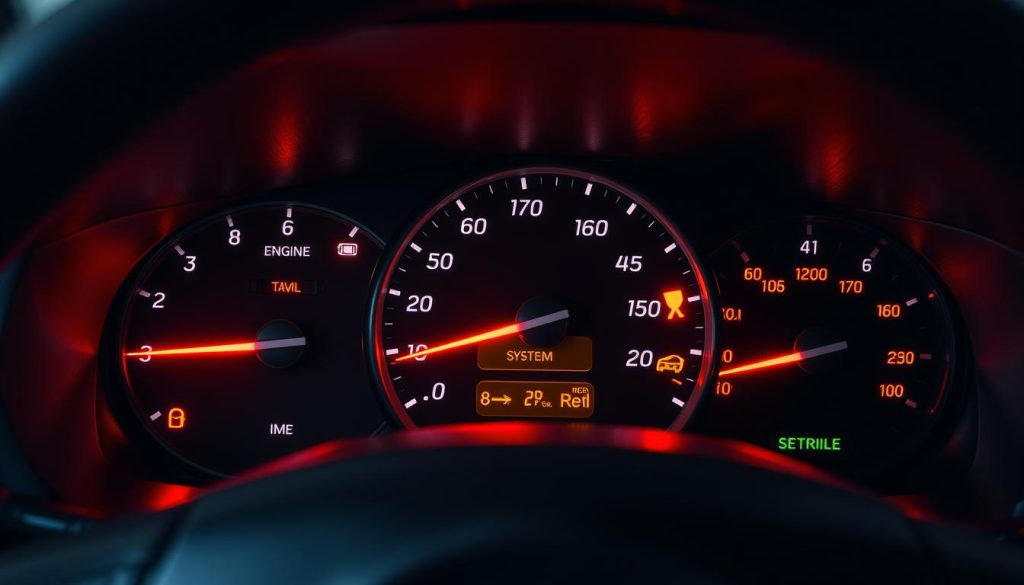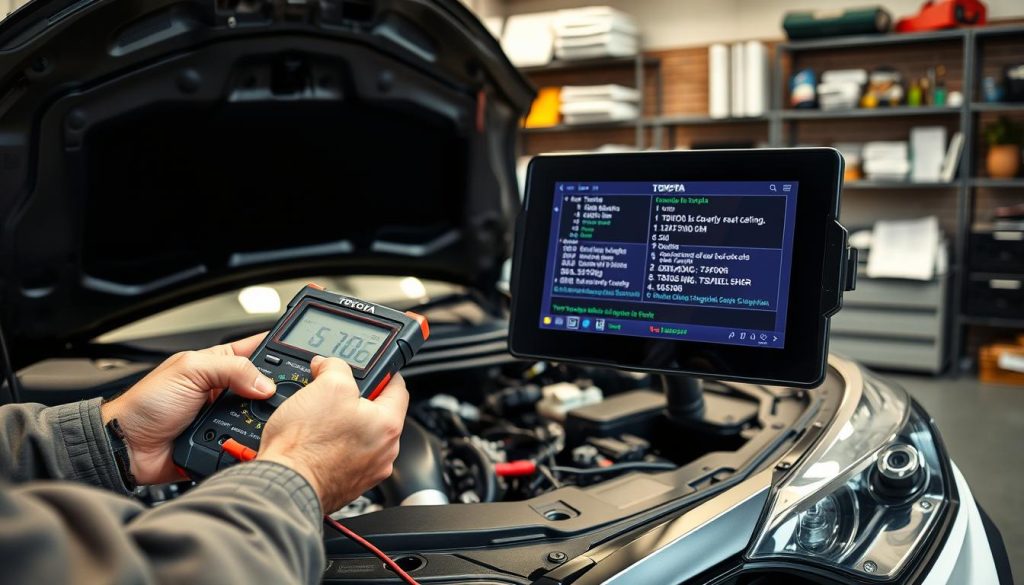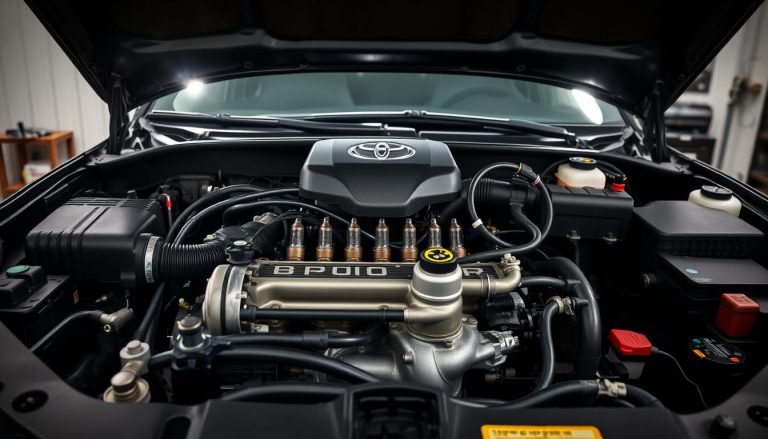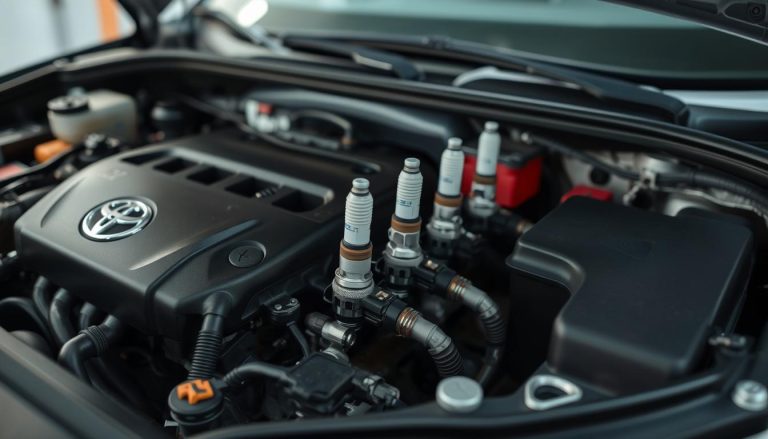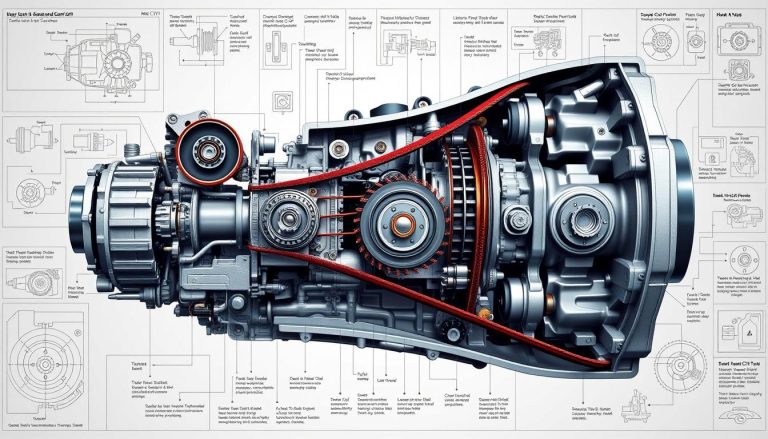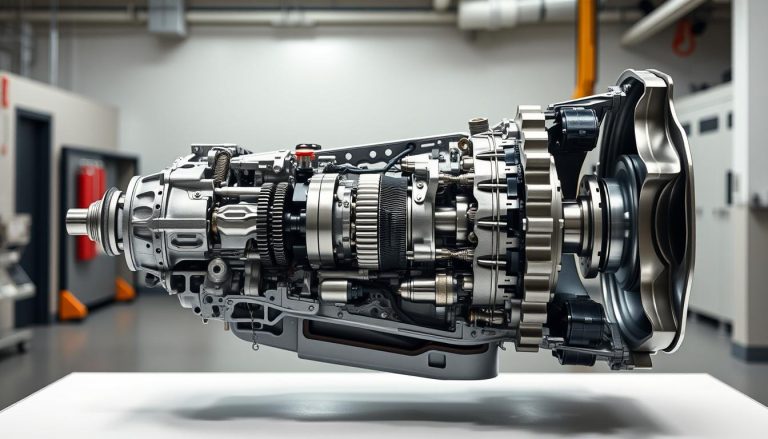Toyota Electrical Problems: Causes & Solutions
Toyota cars are known for their dependability. Yet, they can face electrical issues that affect their performance. This guide covers common Toyota electrical problems, their causes, and solutions. Knowing about these issues helps keep your car running well and lasts longer.
This article helps you figure out why your Toyota’s electrical system might fail. It also shows how to fix these problems. By solving these issues, your Toyota will stay reliable. Read on to learn how to handle these problems.
Understanding Toyota Electrical Problems
Toyota electrical issues can be tricky to spot at first. But, they often show clear signs that need to be seen. Knowing these signs helps you catch problems early and fix them fast.
Common Symptoms
Spotting the usual signs of Toyota electrical problems is key. Look out for:
- Dim or flickering headlights
- Erratic dashboard displays
- Unresponsive starters
- Unusual noises or smells from the electrical system
Potential Risks
Ignoring these signs can lead to big problems. These include:
- Complete vehicle shutdowns while driving
- Unforeseen breakdowns
- Potential safety hazards while on the road
By understanding and fixing these issues quickly, you avoid expensive repairs. Regular checks and early detection are vital. They help keep your car running smoothly for a long time.
Dead or Weak Battery
A dead or weak battery in Toyota vehicles is a common issue. It can cause a lot of inconvenience. Knowing the signs and how to fix it can prevent breakdowns. Keeping your battery in good shape ensures your Toyota runs well for a long time.
Indicators of a Dead Battery
The signs of a dead battery are easy to notice, if you use your car a lot. Look out for:
- Difficulty starting the engine
- Dimming headlights and interior lights
- Malfunctioning electronic systems
- Unusual clicking sounds when turning the ignition
Watching for these signs can help you avoid being stuck with a dead battery. Regular checks of your Toyota’s electrical parts can solve these problems quickly.
Replacement Solutions
When you face battery problems, there are a few good ways to fix it:
- Jump-starting: This is a quick fix to get your car running so you can get to a service center.
- Battery replacement: If your battery is old or keeps failing, getting a new one is the best solution.
- Checking the alternator: Make sure your alternator is working right, as a bad one can cause battery problems.
- Regular maintenance: Regular checks can stop future electrical problems and make your battery last longer.
| Solution | Benefit |
|---|---|
| Jump-starting | Immediate vehicle use |
| Battery replacement | Long-term reliability |
| Checking alternator | Prevents future malfunctions |
| Regular maintenance | Prolonged battery life |
Malfunctioning Starters
Dealing with a malfunctioning starter in your Toyota can be really frustrating. It often shows as a clicking noise or won’t start at all. This can leave you stuck without warning. Several things can cause this, like a bad solenoid, worn-out starter motor parts, or loose wires.
A faulty solenoid stops the starter motor from connecting with the engine’s flywheel. This blocks the ignition. Worn-out brushes or a bad armature in the starter motor can also cause problems. Plus, loose or corroded wires can mess up the electrical current needed to start the engine. Each of these needs to be fixed fast to avoid more issues.
Fixing starter problems quickly can make your starter last longer. Regular checks can spot issues early. Using the right tools to find and fix the problem is key.
Faulty Alternator Issues
Toyota vehicles are known for their reliability. But, they can face electrical problems. A faulty alternator is a common issue. Fixing it early can prevent problems with your car’s electrical systems.
Signs of a Failing Alternator
Signs of a failing alternator include flickering dashboard lights and dimming headlights. You might also hear an unusual noise from the engine bay. The battery light on the dashboard or a drained battery often are signs too.
These symptoms can affect many electrical parts in your Toyota. If not fixed, they can lead to bigger problems.
Sourcing Replacements
When replacing a failing alternator, choose a new or OEM part. Quality components keep your Toyota running well. An experienced technician should do the repair.
This ensures all electrical parts work right. It prevents future issues.
Common Toyota Electrical Issues
Toyota cars are known for their dependability. Yet, they can face electrical problems. These issues often come from sudden failures of electronic parts and faulty connections. They can impact how well the car works and its safety.
Recurring Problems
Some common Toyota electrical issues include:
- Malfunctioning sensors
- Dashboard warning light failures
- Power windows and locks problems
- Random ECU resets
Fixing these problems quickly can stop a bigger Toyota electrical system failure. It helps keep driving smooth.
Preventive Maintenance
Preventive maintenance is key to avoiding costly fixes. To reduce the chance of Toyota electrical issues, take these steps:
- Check electrical connections and wires for damage or rust.
- Keep battery terminals clean and tight to avoid Toyota electrical system failure.
- Have a certified tech do regular maintenance checks.
- Fix any small electrical problems right away to prevent bigger issues.
Being proactive with maintenance can make your car last longer and work better. It helps avoid the Toyota electrical system failure problems.
Electrical System Failures
Toyota vehicles use their electrical systems for many important functions. When these systems fail, it can really slow down the car and make it less safe. Knowing what can go wrong, like problems with control modules and fuse boxes, helps fix issues quickly.
Control Module Failures
Control modules are key to a Toyota’s electrical system. They manage everything from the engine to power distribution. If they fail, it can cause power loss in important systems like the ignition and lights. Toyota’s electrical checks can find these problems early, helping fix them and make the car reliable again.
Fuse Box Issues
Fuse boxes protect the electrical system from too much power. But, they can have problems like corrosion or loose connections. These issues can cause power to go out sometimes. Checking the fuse box first is often the start of fixing these problems. Making sure connections are good and replacing bad fuses helps keep the car running well.
| Common Issue | Symptoms | Solution |
|---|---|---|
| Control Module Failures | Intermittent power loss, error codes | Professional diagnostics and module replacement |
| Fuse Box Issues | Sporadic electrical failures, blown fuses | Inspection, cleaning, replacing faulty fuses |
Wiring Problems in Toyota Vehicles
Toyota electrical wiring problems can really affect your car’s performance. These issues often come from wear, corrosion, or damage. This can make electrical parts act strangely and even be dangerous. It’s important to check your car often and fix problems quickly.
Signs of wiring problems in Toyotas include flickering lights and accessories that don’t work right. If you see these signs, check your car carefully or get help from a pro right away.
To keep your Toyota running well, take these steps:
- Check wiring harnesses for wear and damage often.
- Replace old or corroded wires fast.
- Use only top-quality parts to keep your car’s electrical system working right.
Fixing wiring problems in Toyotas quickly makes your car safer and helps your electrical parts last longer.
Corroded Battery Cables
Corrosion on battery cables is a common problem in Toyota vehicles. It can cause many issues, like starting problems and power supply issues. Keeping these cables in good shape is key for your car to run well.
Corroded cables can mess up your car’s electrical system. They might cause electrical problems that come and go. To fix this, it’s best to get new cables from a certified Toyota dealer. This keeps your car’s electrical system working right.
Spark Plug Issues
Spark plug problems can really hurt your Toyota’s performance and fuel use. It’s key to check them often and replace them when needed to keep your car running well.
Effects of Worn Spark Plugs
Worn spark plugs can hide behind many Toyota electrical issues. They can cause:
- Poor acceleration
- Diminished fuel efficiency
- Starting troubles
These issues are not just annoying. They can also point to bigger problems in your car’s electrical system. This means you might need to get it fixed right away.
Replacement Tips
Toyota says to change spark plugs every 30,000 miles for the best engine performance. Here are some tips to do it right:
- Always use spark plugs as per the manufacturer’s specifications.
- Check spark plug wires for wear or damage.
- Make sure new spark plugs are tightened correctly.
Some people try to fix this themselves. But getting a pro to do it is safer. It makes sure your Toyota is fixed right and avoids future problems.
Dealing with ECU Problems
ECU issues in Toyota vehicles can be tough to handle. It’s key to know the signs and how to diagnose them. This ensures your car runs well and lasts long.
ECU Malfunction Symptoms
Toyota electrical system failures show up in different ways. Look out for:
- Poor engine performance
- Frequent stalling
- Check engine light illumination
- Irregular fuel consumption
- Starting issues
Catching these signs early can avoid bigger problems and expensive fixes.
Diagnostic and Repair Options
When dealing with ECU issues, accurate diagnostics are vital. Here’s what to do:
- Use a professional-grade OBD-II scanner to read trouble codes.
- Interpret the code meaning to pinpoint the specific issue.
- Check all relevant electrical connections and wiring for integrity.
- Reset the ECU and observe if the issue persists.
- Consult a certified Toyota technician for in-depth diagnostics and repairs.
Following these steps helps keep your Toyota running smoothly. It also prevents long-term damage from electrical system failures.
| Diagnostic Tool | Function | Recommendation |
|---|---|---|
| OBD-II Scanner | Reads trouble codes from the ECU | Essential for initial diagnostics |
| Multimeter | Checks electrical connections and voltages | Useful for verifying wiring integrity |
| Professional ECU Testing | Provides in-depth analysis | Recommended for persistent issues |
Toyota Electrical Troubleshooting
Fixing Toyota electrical problems needs the right tools and steps. This ensures you find and fix issues correctly. It saves time and prevents more damage to your car.
Diagnostic Tools
Advanced diagnostic tools are key for fixing Toyota electrical issues. They help find the main cause of problems. Important tools include:
- OBD-II Scanner: Essential for reading and fixing error codes.
- Multimeter: Checks voltage, current, and resistance in the electrical system.
- Battery Tester: Shows how well the battery is working.
Steps for Effective Troubleshooting
Here are steps for successful Toyota electrical troubleshooting:
- Initial Inspection: Look at all electrical parts and wiring for damage or wear.
- Read Error Codes: Use an OBD-II scanner to get diagnostic trouble codes (DTCs).
- Test the Battery: Check the battery’s health with a battery tester.
- Check Connections: Make sure all electrical connectors and terminals are clean and tight.
- Measure Voltage and Continuity: Use a multimeter to check voltage and circuit continuity.
- Analyze Results: Compare tool data with the manufacturer’s specs to find issues.
By following these steps, you can find and fix electrical problems in your Toyota. This ensures your car works well and reliably.
Importance of Professional Electrical Repairs
Getting professional help for Toyota electrical repairs is key. DIY fixes might seem easy, but they can cause more harm than good. They can damage your car’s electrical parts.
Why Avoid DIY Fixes
DIY electrical repairs can create many problems. Without the right skills and tools, you might not find the real issue. This can make things worse.
Fixing electrical problems yourself can also damage important parts. This can lead to expensive repairs later. Plus, it might void your car’s warranty, which is a big financial risk.
Benefits of Certified Technicians
Certified technicians know a lot about Toyota electrical parts. They use special tools to find and fix problems. This makes sure your car works well.
Using a professional for repairs gives you peace of mind. It also keeps your car reliable and in good shape. Technicians follow Toyota’s rules, so your car’s warranty and value stay safe.
| Aspect | DIY Fixes | Certified Technician Repairs |
|---|---|---|
| Accuracy | Often inaccurate due to lack of tools | High accuracy with advanced diagnostics |
| Warranty | May void Toyota warranty | Preserves Toyota warranty |
| Safety | Risk of improper fixes | Ensures safe and reliable repairs |
| Cost | Potentially higher due to further damage | Cost-effective with proper fixes |
Conclusion
Toyota is known for being reliable, but electrical problems can happen. Fixing these issues quickly is important for your car’s performance and safety. Look out for signs like dead batteries, weak starts, and bad alternators to avoid bigger problems.
Regular car checks and knowing where trouble might start are key. Things like corroded cables and faulty ECU units need expert care. This care can make your car last longer and work better.
Knowing a lot about cars and getting help from pros is important for a good car experience. Follow the advice given to keep your car running smoothly. This way, you can avoid unexpected breakdowns and expensive fixes.
FAQ
What are common symptoms of electrical problems in Toyota vehicles?
Signs include dim headlights and erratic dashboard displays. You might also face unresponsive starters and flickering lights. Sometimes, you could experience power loss, even leading to a complete shutdown while driving.
What should I do if my Toyota’s battery is dead?
A dead battery shows as hard engine starts and dim lights. It also affects electronic systems. Try jump-starting, replace the battery, and check the alternator. Regular checks are key.
How can I identify if my Toyota’s starter is malfunctioning?
A bad starter might click but not start, or it won’t start at all. Problems can be a faulty solenoid or worn starter parts. Loose wiring is another cause.
What are the signs of a failing alternator in my Toyota?
Look for flickering dashboard lights and a dead battery. Replacing the alternator with an OEM part is best. A pro should verify it.
What are recurring electrical problems in Toyota vehicles?
Issues include sudden failures of electronics and unreliable connections. Regular checks and quick fixes of small problems can prevent big, expensive issues.
How do I handle electrical system failures in my Toyota?
Failures might come from bad control modules or fuse box issues. Detailed diagnostics and part replacements are needed to fix it.
What causes wiring problems in Toyota vehicles?
Wear, corrosion, or damage can cause wiring issues. Regular checks and repairs can fix and prevent these problems.
How do corroded battery cables affect my Toyota?
Corroded cables can make starting hard and cause power issues. Replacing them through a dealer ensures they work right.
What are the effects of worn spark plugs in Toyota vehicles?
Worn spark plugs lead to poor acceleration and fuel efficiency. Replacing them every 30,000 miles keeps your engine running well.
How can I deal with ECU problems in my Toyota?
ECU issues can cause engine problems and stalling. A pro with the right tools is needed for accurate diagnosis and fix.
What tools are used for effective electrical troubleshooting in Toyota vehicles?
Advanced tools are key for finding and fixing electrical problems. They help do detailed checks and find errors with diagnostic codes.
Why should I avoid DIY electrical repairs on my Toyota?
DIY repairs can cause more harm than good. Certified technicians ensure the right fixes, keeping your warranty and vehicle safe.

